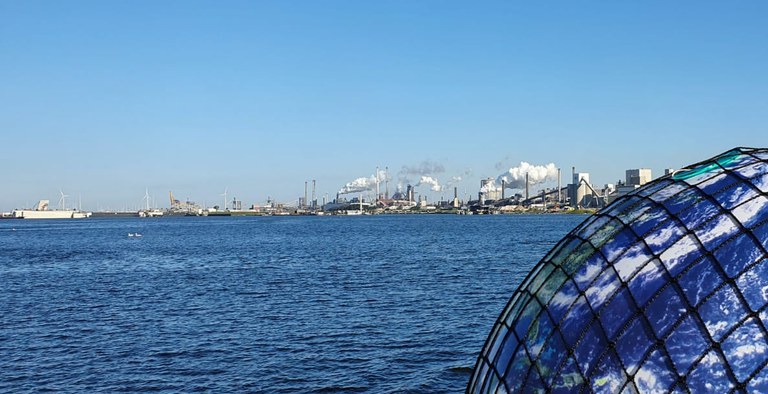Winning the climate case against Shell changed everything, The court ordered Shell to do a whole lot more to rescue our climate. And to speed up its efforts, too. What goes for Shell, also goes for all large polluters. So Milieudefensie went on to ask 29 other Dutch multinationals about their climate plans.
> Read more about our victory in the climate case against Shell here
Coverfoto (top): Two members of Milieudefensie on their way to 1 of the 29 multinationals, FrieslandCampina, to hand over our letter. FrieslandCampina is one of the world’s largest dairy companies.
Until now, multinationals managed to get away with greenwashing. Governments were reluctant to come down on these companies. But now that they face the threat of being taken to court, large companies are more inclined to start acting. This is important, because if we do not get the large polluters on board, we cannot stop dangerous climate change.
Milieudefensie’s director Donald Pols: “Now that the courts are forcing Shell to take its responsibility in resolving the climate crisis, it is clear that other major emitters will now also have to take swift action to go green.”
To date, the large polluters are taking far too little action. This is why, in January 2022, we wrote a letter to 29 Dutch multinationals, active in various sectors of the economy. We had a concrete demand: Come up with a climate plan that is in line with the Paris Climate Agreement. This plan should detail how they intend to reduce their CO2 emissions by at least 45% by 2030.
We will have these plans assessed by the New Climate Institute, a renowned international research agency. All plans were submitted to us well before the deadline (April 2022).
If the companies concerned have failed to present a sufficiently concrete and equitable climate plan, Milieudefensie will consider follow-up steps. Milieudefensie director Donald Pols: “We will continue to fight dangerous climate change and will keep up the pressure on these major climate polluters until they contribute to the solution.”

Photograph: View on Tata Steel IJmuiden, 1 of the 29 key climate polluters.
ABN AMRO, ABP, Aegon, AholdDelhaize, AkzoNobel, Atradius, BAM Groep, Boskalis Westminster, BP, Dow, DSM, Exxon Mobil, FrieslandCampina, ING Groep, KLM, LyondellBasell, NN Group, PfZW, Rabobank, RWE, Schiphol, Stellantis, Tata Steel, Unilever, Uniper, Vion, Vitol, Vopak, Yara. Also counting Shell, this makes 30.
These companies were carefully selected. They operate in different areas of the economy and are leading within their sectors. When they decide to act, other companies in their sector will follow.
Our website uses cookies to ensure the use and functionality of this website. Read more about our cookie policy